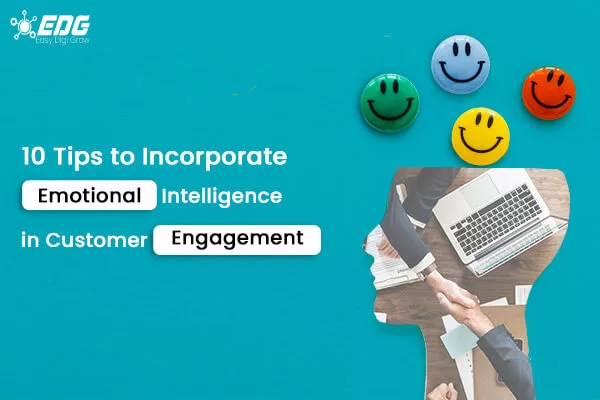Are you curious about the role of Emotional Intelligence in customer engagement? How can understanding and managing emotions lead to more satisfied customers and stronger brand loyalty?
In this blog, we will explore the power of Emotional Intelligence in Customer Engagement and discover effective strategies to incorporate it into your business practices.
So, let’s dive in and uncover the secrets to creating meaningful connections with your customers through Emotional Intelligence.
Emotional Intelligence in Customer Engagement is Not Just a Buzzword
By harnessing the power of emotions, businesses can establish deep connections with their customers.
But what exactly is Emotional Intelligence in the context of customer engagement?
Emotional Intelligence means being able to recognize, understand, and handle emotions in yourself and others.
It involves empathy, active listening, and adaptability to meet customers’ emotional needs.
When businesses prioritize Emotional Intelligence, they go beyond delivering exceptional products or services. They focus on building genuine human connections and fostering positive emotional experiences.
Imagine a customer reaching out to your support team with a complaint. How would an emotionally intelligent approach impact their experience?
By showing empathy, actively listening to their concerns, and adapting your communication style to their emotional state, you can transform a potentially negative situation into an opportunity to build trust and loyalty.
Understanding Emotional Intelligence in Customer Engagement
Emotional intelligence refers to the capacity to recognize, understand, and manage emotions, both in oneself and others.
In the context of customer engagement, emotional intelligence involves the ability to empathize with customers, actively listen to their concerns, and adapt interactions to their emotional needs.
It goes beyond providing excellent products or services; it focuses on building human connections and fostering positive emotional experiences.
See what’s trending on EasyDigiGrow: Gamification in digital marketing: A strategy of the lifetime for your business
The Importance of Emotional Intelligence in Customer Engagement
Emotional intelligence plays a vital role in customer engagement for several reasons:
- Improved Understanding: Emotional intelligence allows businesses to gain a deeper understanding of customer needs, preferences, and pain points.
By empathizing with customers, organizations can tailor their offerings to better meet their expectations, resulting in increased customer satisfaction.
- Enhanced Communication: EI enables businesses to communicate effectively with customers. By actively listening to their concerns and responding with empathy, organizations create an environment where customers feel valued and understood.
This fosters open dialogue and builds trust.
- Conflict Resolution: In customer engagement, conflicts may arise. Emotional intelligence equips businesses with the skills to handle conflicts in a constructive and empathetic manner.
By managing emotions and finding mutually beneficial solutions, organizations can turn conflicts into opportunities for strengthening customer relationships.
- Building Trust and Loyalty: Customers are more likely to engage with businesses they trust. Emotional intelligence in branding helps organizations project authenticity, transparency, and reliability, leading to the establishment of trust.
Trust, in turn, fosters customer loyalty, repeat purchases, and positive word-of-mouth recommendations.
20 Tips to Incorporate Emotional Intelligence in Customer Engagement
- Show Empathy: Demonstrate understanding and compassion towards your customers. Put yourself in their shoes and imagine how they might be feeling.
This empathetic approach allows you to connect with them on a deeper level.
- Practice Active Listening: Give your full attention to customers when they speak. Listen carefully, ask clarifying questions, and show genuine interest in what they have to say.
Thus, this active listening helps you understand their needs and concerns better.
- Use Positive Language: Choose words that convey positivity and support. Use phrases such as “I understand” or “I’m here to help.”
Positive language creates a more uplifting and reassuring customer experience.
- Adapt to Individual Needs: Recognize that each customer is unique and may require different approaches.
Furthermore, tailor your communication style to their preferences, whether they prefer direct and concise information or a more conversational tone.
- Manage Your Emotions: Stay calm and composed, even in challenging situations. Be aware of your own emotions and choose thoughtful responses.
Managing your emotions helps create a more positive and constructive interaction.
- Seek Feedback and Act on It: Ask customers to share their thoughts and experiences. Actively seek their input and take their suggestions or concerns seriously.
So, by demonstrating that their opinions matter, you show a commitment to continuous improvement.
- Build Trust through Consistency: Be consistent in your interactions and follow through on your commitments.
When customers can rely on your consistency, it builds trust and confidence in your business.
- Resolve Conflicts with Empathy: Address conflicts with empathy and a desire to find a mutually beneficial resolution.
Furthermore, understand the underlying concerns and work towards a solution that leaves the customer feeling heard and satisfied.
- Personalize the Experience: Treat every customer as a unique person and customize their experience. Moreover, use their name, reference past interactions, and offer tailored solutions.
This special approach shows that you appreciate their specific needs.
- Practice Self-Reflection: Regularly reflect on your own emotional intelligence skills and identify areas for improvement.
Seek opportunities to enhance your empathy, active listening, and emotional awareness.
- Cultivate Empathy Within the Team: Foster a culture of empathy within your organization.
Hence, encourage team members to support and understand one another, as this will translate into more empathetic customer interactions.
- Anticipate Customer Needs: Proactively identify and address customer needs before they are even expressed.
This shows customers that you truly understand and care about their requirements.
- Express Appreciation: Take the time to express genuine appreciation to your customers.
Show gratitude for their support and loyalty, and let them know that their business is valued.
- Offer Emotional Support: Recognize that customers may sometimes require emotional support beyond the product or service you provide.
So, be there to lend a listening ear and offer comforting words during difficult situations.
- Practice Emotional Regulation: Develop techniques to effectively manage your emotions during customer interactions.
This will allow you to respond calmly and thoughtfully, even in challenging circumstances.
- Provide Clear and Transparent Communication: Ensure your communication is clear, concise, and transparent.
Avoid jargon or complicated language that may confuse or frustrate customers.
- Educate Customers: Empower your customers with the knowledge and resources to make informed decisions.
Therefore, educate them about your products or services, providing valuable insights that can enhance their experience.
- Create Emotional Connections: Build emotional connections with customers by sharing stories, experiences, and values that resonate with them.
As a result, this helps to establish a deeper bond and foster long-term loyalty.
- Practice Graciousness: Approach every customer interaction with grace and humility.
Acknowledge your mistakes, apologize when necessary, and take immediate steps to rectify any issues.
- Celebrate Success Together: Recognize and celebrate milestones and achievements with your customers.
Make them feel like part of a larger community or family, creating a sense of belonging and shared accomplishment.
Check out our guide on Data Privacy: Achieving the Perfect Balance between Personalization and Privacy in the Digital Era
Few relevant examples that businesses are adapting for emotional intelligence in customer engagement
- Amazon
Amazon uses Emotional Intelligence to personalize the customer experience. For example, Amazon’s “Customer Obsession” principle is based on the idea that employees should focus on understanding and meeting the needs of customers.
Amazon also uses AI to analyze customer data and identify patterns in their behavior. This information is then used to personalize the customer experience, such as by recommending products that customers are likely to be interested in.
HDFC Bank
HDFC Bank, a prominent private sector bank in India, has implemented emotional intelligence practices in its customer interactions. They train their employees to exhibit empathy, active listening, and emotional awareness while addressing customer concerns. This approach has helped HDFC Bank in establishing long-term relationships with customers based on trust and understanding.
- Zomato
Zomato, a popular food delivery and restaurant discovery platform, prioritizes emotional intelligence in its customer engagement strategies. They emphasize empathy and actively address customer concerns. Zomato’s customer support team is trained to handle complaints with understanding, ensuring that customers feel heard and valued.

- Lenskart
Lenskart, a popular online eyewear retailer, leverages emotional intelligence to provide a personalized shopping experience. They offer virtual try-on tools, personalized recommendations, and empathetic customer support. Lenskart’s focus on emotional intelligence has helped them create a loyal customer base.

- MakeMyTrip
MakeMyTrip, a leading online travel company in India, incorporates emotional intelligence as its top digital marketing strategy into its customer interactions. They understand the emotions involved in travel planning and provide personalized assistance based on individual preferences. MakeMyTrip’s empathetic approach has helped them build trust and loyalty among their customers.
Also, check out our top website design trends to create beautiful trendy websites for your business
Final Thoughts
Emotional Intelligence in customer engagement is a powerful tool that can elevate your business to new heights.
At EasyDigiGrow, a leading digital marketing company in Delhi/NCR, we understand the significance of Emotional Intelligence in customer engagement. Our team of experts is well-versed in harnessing the power of emotions to create meaningful connections between businesses and their customers.
Contact us today to discover how we can revolutionize your customer engagement through the power of Emotional Intelligence.
Your customers deserve an exceptional experience, and we are here to make it happen!
FREQUENTLY ASKED QUESTIONS
- Can you explain the five principles of emotional intelligence?
The five principles of emotional intelligence are self-awareness, self-regulation, motivation, empathy, and social skills. These principles involve understanding and managing one’s own emotions, setting goals, connecting with others, and effectively communicating. By cultivating these principles, individuals can enhance their emotional intelligence and improve their relationships and overall well-being.
- How does emotional intelligence impact customer satisfaction?
Emotional intelligence positively impacts customer satisfaction by enabling businesses to understand and meet customer needs effectively. Thus, when organizations are listening to customer emotions, they can provide personalized experiences and address concerns in a timely and empathetic manner, leading to increased customer satisfaction.
- Can emotional intelligence help in customer retention?
Yes, emotional intelligence plays a significant role in customer retention. By demonstrating empathy, active listening, and emotional awareness, organizations can build strong relationships with customers.
- How can businesses develop emotional intelligence in their customer-facing teams?
To develop emotional intelligence in customer-facing teams, businesses can invest in training and development programs. These programs can include workshops, role-playing exercises, and coaching sessions focused on empathy, active listening, emotional awareness, and other relevant skills. Regular feedback and reinforcement can also help team members enhance their emotional intelligence capabilities.
- What are the benefits of emotional intelligence in customer engagement?
Emotional intelligence brings several benefits to customer engagement. It helps in creating personalized experiences, building trust and loyalty, resolving conflicts effectively, and fostering positive customer perceptions. Ultimately, emotional intelligence leads to improved customer satisfaction, retention, and advocacy.
- Can emotional intelligence be learned and improved?
Yes, emotional intelligence can be learned and improved through dedicated efforts. It involves self-awareness, self-reflection, and ongoing practice. By actively seeking opportunities to develop emotional intelligence skills, individuals can enhance their ability to connect with others and excel in customer engagement.
- How can emotional intelligence impact the overall success of a business?
Emotional intelligence has a profound impact on the overall success of a business. By fostering stronger customer relationships, emotional intelligence drives customer satisfaction, loyalty, and advocacy. Satisfied customers are more likely to become repeat buyers and recommend the business to others, leading to increased revenue and market growth.
















